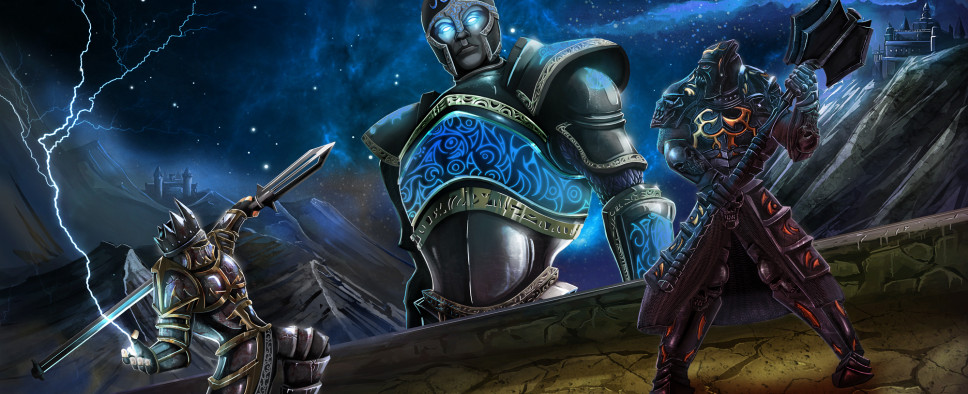Lords of Xulima Review
-
Category: ReviewsHits: 20557

Article Index
Introduction
Lords of Xulima (LOX) is the debut effort from Spanish developer Numantian Games. It takes place in a world where the gods have mysteriously disappeared, but where one of them contacts your party in a dream, and asks it to purify the eight temples of the gods, which have been converted into prison camps -- or worse -- by the renegade god Yul. The eight temples are scattered throughout the world of Xulima, and each one can only be entered after acquiring a key from a boss creature, and so accomplishing your divine task requires hundreds of battles against dozens of different types of enemies.
In other words, LOX is a grind-it-out RPG, somewhere in the same vein as the King's Bounty games, and its focus is much more on honing the fighting skills of your party than it is about story or questing or interesting characters. But is it the right game for you? Keep reading to find out.
Characters
When you start a new game of LOX, you have to create your party of six characters. One of these characters is required to be Gaulen the Explorer, who is the only character who can be the Explorer class. Your other characters can choose between being an Arcane Soldier, Barbarian, Bard, Cleric, Divine Summoner, Mage, Paladin, Soldier, or Thief, where each of these classes does about what you would expect. For example, the Paladin mixes melee combat with healing, while the Bard can buff your party or debuff your enemies.
Each class gets a selection of skills and spells, including weapon and armor proficiencies, combat maneuvers, offensive spells, and healing spells. Most of the skills and spells are for combat, but there are also Thief skills for detecting hidden items, disarming traps, and picking locks, and Explorer skills for easier traveling, better herb gathering (where herbs can be used to improve character stats), and camouflage (which allows you to avoid unwanted combat). Many skills and spells are shared amongst multiple classes, but the improvement costs are usually different. For example, Barbarians only have to pay one point to improve weapon skills while Clerics have to pay three points. Each character gains four skill points per level, and there are numerous other ways to earn skill points as well (including herbs, trainers, and magic fountains), so you don't have to agonize over where to put your points or worry about respeccing your characters.
Each character also has five attributes: Strength (damage and carrying capacity), Constitution (health), Agility (hit chance and defense), Speed (battle quickness and evasion), and Energy (power points for spells and combat maneuvers). Characters get to improve two attributes per level, but sort of oddly, Speed is by far the most important one, especially early in the game, and so it's just a matter of choosing which attribute to advance along with Speed each level.
To round out your characters, they also get a name and gender (which don't make any difference in the game), a preferred weapon (which gives them an extra point in the associated weapon skill), and a god (which provides a small bonus). Characters also get a portrait. The game includes 32 portraits for you to choose from, but you can also import your own.
Gameplay
LOX is presented in 2D using an isometric view. Your party is represented by Gaulen, who also does the talking for you. You move Gaulen around by clicking where you want him to go, or by using the WASD or arrow keys to usher him along. You can toggle whether you want Gaulen to walk (which is good when you want to avoid traps) or run (which is good otherwise).
The world of Xulima is divided into 14 map regions. Four of these maps include towns, which are all but identical. Each town includes a priest to heal wounds and cure debuffs (like curses and diseases), a food merchant to sell you food for your travels (you can also pick food from various bushes in the world), an equipment merchant (who sells a little bit of everything), and a trainer (who gives you quests and sells you skill points).
Your party requires food and rest as it travels. Each step you take costs a little bit of food, with the tougher terrains (deserts and tundras) requiring more than friendly forests and roads. If your party runs out of food, then it takes an immediate and nasty debuff, and it also starts losing health, where the longer the starvation goes on, the more damaging it becomes. Fortunately, you can buy town portal scrolls, which return you immediately to a town where you can buy food. There are also dimensional portals in most of the maps that let you travel around easier.
The quests in the game are very basic, usually just requiring you to find missing people or collect items from foes. None of the quests add anything to the story, and you're not given any options for how to complete them. Some of the quests are also "bad," where the items you're tasked to turn in are worth far more than the reward.
The story in the game is also very basic. The premise about the missing gods and their temples is pretty much everything. You're also not given any options in the conversations you have. They're entirely scripted, where you just have to press the "continue" button to see the next line of dialogue. So there's only one way for the story to go, and it's not a very interesting way.


